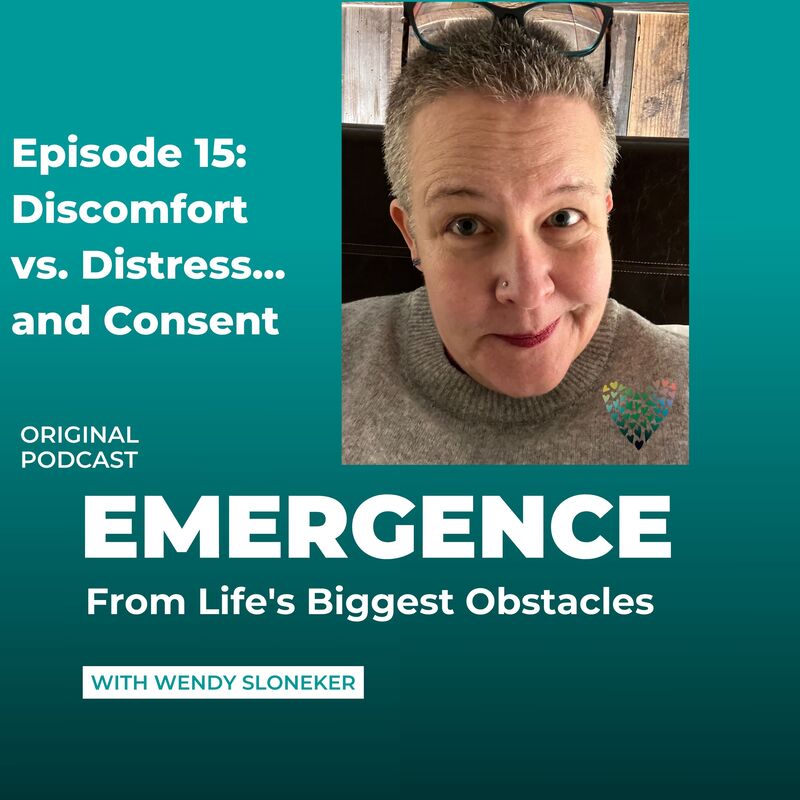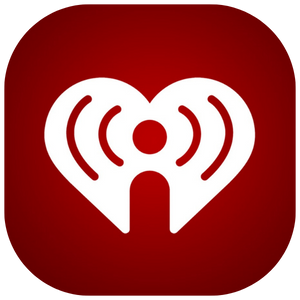Episode 15: Distress vs. Discomfort…and Consent
|
If you’re in a shadow season or a heavy time of loss, you know the process of healing can be painful and scary. There are moments within that process that you might think you’re just not going to make it through.
Emergence Coach Wendy Sloneker shares where this healing experience fits within your Emergence journey and your process of navigating feelings of grief or loss. In this episode, Wendy explains the difference between distress and discomfort. Nothing will move or shift if you choose not to allow some of that discomfort to come on in. Wendy guides us through how to stay present in our bodies while we sit in discomfort. When we can learn to tolerate it, let ourselves be uncomfortable, the healing can begin. |
If you could use support in navigating your own discomfort, finding your edge, and noticing your own signals of discomfort vs. distress, connect with Wendy. She is offering a complimentary call to start your process. Find more information at wendysloneker.com.
As seen on: |
|
Full Episode Transcript
Wendy Sloneker
You're listening to the Emergence from Life's Biggest Obstacles podcast, with Wendy Sloneker. And this is episode 15. Hi, I am I have just completed a session of grief shifting session. It's one of the few places I work in a group. And it was for the oh gosh, it's the equinox evolution. This is indeed, Friday, September 22. At the time of this recording, this is the equinox of 2023. And just coming out of a group, grief shift session where we take stuck or stagnant energy, and we invite it to open up and move.
And I wanted to talk a little bit today about distress versus discomfort, because there's the difference. And also consent. I'm actually going to start with consent. When it comes to grief and loss, nothing is going to move or shift without your go ahead. And this is more than dreaming of shifting. This is I invite movement in this area of heaviness. There is such a thing as a healing pain similar to there being a growing pain. This is part of expansion. And it is also part of how we learn to and get to receive more life, and aliveness.
This can be very scary prospect for people who are in a heavy shadow season, or a heavy time of loss, whether it's recent or long ago, the prospect of shifting grief energy, even if it's familiar, even if it's painful, can be just terrifying. I want to honor that. You don't have to move it, you don't have to shift it, you don't have to let it go. You can be these are options but have two does not play a role.
Inviting some movement to achieve and arrive at more life is a brave thing. Often, often, in grief and loss seasons, we are sort of pushed into this time of life without having signed up. Without having asked for it. Life changes on a dime or our worlds are suddenly upside down from what we knew.
We are different from who we know ourselves to be very scary, the prospect of movement or shifting, it's understandable that it would be so scary or potentially scary. We don't know how we are going to feel we're actually just afraid that we will die in trying to move through it.
In my session what I offer because it can also be daunting like to be told to let it go and not know how to do it. I hated that that would always like make the veins on my neck just bulge out like somebody in my in the height of my stress cycles. For someone to tell me to relax and have it be an intellectual exercise. It just pisses me off.
So instead of having the pressure and the job and the task of letting it go, what if you being present in your body? And we do that by putting your hands somewhere loving on your body? In a gentle way? My hand is on my between my clavicles. I'm like are the clavicles in footnote between my collarbones Yeah, anatomy is not my strong suit. Thanks for playing. By my collarbones kind of just below my throat. That is a loving space for me. You might have your hand on your face on your cheek. This is a nurturing place to have your hand you might have your hands at your spine or on your hips or on your knees. Totally good.
Noticing is how we get in our body and in this moment. So I'm here and present with you. Now, even if you're listening later. Now all we ever really have is now and we're here. and present in the body.
Well done, number one. Then the other part is, how about, we let whatever that stagnant energy is, we allow it from this presence, to let it letting go of you. It's kind of, I imagine, hands on my shoulders suddenly lifting off. They on unclamp, it's like somebody was standing at my back with their hands on my shoulders, and sometimes in a space of pressure or stress, it feels like they're gripping my shoulders.
And so when I let it, let go, of me, I'm imagining those hands, releasing the grip, and lifting the weight of those hands off of my shoulders. And it lifts off in a way he gets to go be something else, somewhere else, it gets to be changed. By the nature of Earth. There's plenty of places here on Earth where energy is needed. And we're gonna let that pressure, that stress, turn into something else. So often, we're afraid that like, if I release it, it's gonna get on somebody else and feel this way for them no.
It, that is optional. It doesn't have to do that, if you are able to release. If you let it let go of you. It gets to be something completely different for somebody else. What if it was loving? What if it turned and transmuted into the biggest kindness it could possibly be? And that can be pretty big. It gets to be that it's sort of like doing a flip turn. As that energy comes out of your body. It kind of flips into something else and continues on in a brand new lap in a brand new pool.
You're not going back down. It's kind of like esoteric and cosmic flip turn where it's actually flipping itself out of your body and into the bigger world where it can go do some good with all this energetic upcycling, welcome. Really good.
I'm gonna just like, let that sit with you for a moment. And just listen. See what's there? How does this land with you have a listen, write any notes down that are coming to you. This is valuable. This is a new concept.
And I'm going to gently turn to noticing we're gonna do a little bit more noticing for just another minute. And it is the difference between I want to discuss the difference between discomfort and distress. Distress is like a panic. Almost it's it's almost like you're, you're inviting or like, the trauma responses are at the door. That's not where we want to go. It's optional. Those trauma responses, our fight, flight, freeze, or fawn. And this is not this is not the status where we're at. This is not the destination of where we do grief work. We do grief work with incredible care and gentleness. And we move up to a place of discomfort.
Sometimes we feel uncomfortable with new and excellent support. This was the story for me. I found it almost like almost like it burned to have gentle care and support because it was so unfamiliar and I was so afraid of quote unquote the other shoe dropping. Being you know of, of going lower of get of my emotional experience getting heavier of me losing anything else.
And so receiving and learning to trust, gentle care and support and identify it and then discern the source and decide whether or not to allow it. That was uncomfortable. Mostly because it was unfamiliar. Once I got a little bit used to it. It started to feel a little bit better. It didn't be burn for me, it was kind of a burn. But I could tolerate it a little bit more. And then a little bit more. And only when I was ready, did I seek out, maybe a little bit more support, maybe a little bit more attention on those wounded spots. So they could heal. Because I was really interested in those emotional wounds, being scars, and not just continuing to be open weepy wounds.
So distress versus discomfort, I want you to consider just taking a look. As you move about your day, as you move about this podcast as you move about your life. Where is it? Uncomfortable? Something I'm working through something I'm healing through? And what are my edges where discomfort can turn to or intensify into distress because that again, it's a signal and the shit is subtle. So I want to acknowledge that it may take just a little bit of more present care and attention. Where am I hands? am I breathing air that is cool, or warm. My breathing air that is dry, we're kind of muggy.
This is how we get back in the moment back in our bodies, where we can observe where we are safe inside of our own physical, human self container. And we can just take a look. What are the sensations? When does discomfort turn into distress? What are some of those signals? And can I identify it? Like if you're in a moment of discomfort? That's all right. Doesn't have to be a problem. It's actually a little bit of an experiment. Oh, this is uncomfortable about that.
You don't get a sense that for me when I experience discomfort, I don't get a sense that I'm going to die. Like my, my brain just sort of registers that. Yeah, I don't really love it. It's vaguely unpleasant. Let's say if I encountered a really unpleasant odor, a scent. Yeah, not my favorite. And just, it's here. I can move myself, I can let it pass. I can try to open sort of like swish it away with my hands fan it away. But that is a form of discomfort.
It may trigger as now a scent isn't is a powerful thing. So a scent could trigger or activate a memory where like, Ooh, I really thought I was going to like, be in mortal peril, die. And you're not there. That's not where you're at right now. You don't have to here's the thing. You don't have to relive trauma in order to heal from it. You can there are experts who who do this, and it's a tolerance thing and a normalizing thing. And I'm not a therapist, so I don't really know. But there are people who will take you through in safe ways. And I believe there's, you know, there are options.
This is about feelings. When we're reliving the story, we're telling the story. When we are observing a memory, we can access what's going on in my body. Why am I thinking that? What am I feeling now? And it is the difference between discomfort and distress. Discomfort can stretch us in ways that are uncomfortable. Anybody ever had leg day? I'm just asking. I'm pretty sure I had one once. But that discomfort, there is a payoff. Distress is not my realm. That is not where healing comes in. That's where old thoughts and old feelings and old coping mechanisms totally happen just in order to survive. Valid, people are in that space all day, sometimes every day.
Discomfort a little bit at a time that we can integrate and acclimate to stretch a little bit. This is how we achieve a more open heart. More peace as we release. We release and make room. This is how we also encounter and invite flow and nature and what feels organic so we can be present so it's safe to live inside of our bodies and our lives.
Yes, more of that, please. I think that's all I have to say for right now. And thinking about you. I'm sending you loads of loving support. And I'll talk to you again soon. Thank you. Bye for now.
Listen, this is not the destination. The hard stuff is already hard enough. You don't have to make it any harder. You also don't have to wait. Waiting is optional. Connect with me for your free 45 minute connection call. We're going to talk about what private confidential grief coaching into emergence is like and whether or not that's right for you. This is your move. This is your precious life. Let's do this thing. Let's do it together. I'm looking forward to meeting you and I'll talk to you real soon.
You're listening to the Emergence from Life's Biggest Obstacles podcast, with Wendy Sloneker. And this is episode 15. Hi, I am I have just completed a session of grief shifting session. It's one of the few places I work in a group. And it was for the oh gosh, it's the equinox evolution. This is indeed, Friday, September 22. At the time of this recording, this is the equinox of 2023. And just coming out of a group, grief shift session where we take stuck or stagnant energy, and we invite it to open up and move.
And I wanted to talk a little bit today about distress versus discomfort, because there's the difference. And also consent. I'm actually going to start with consent. When it comes to grief and loss, nothing is going to move or shift without your go ahead. And this is more than dreaming of shifting. This is I invite movement in this area of heaviness. There is such a thing as a healing pain similar to there being a growing pain. This is part of expansion. And it is also part of how we learn to and get to receive more life, and aliveness.
This can be very scary prospect for people who are in a heavy shadow season, or a heavy time of loss, whether it's recent or long ago, the prospect of shifting grief energy, even if it's familiar, even if it's painful, can be just terrifying. I want to honor that. You don't have to move it, you don't have to shift it, you don't have to let it go. You can be these are options but have two does not play a role.
Inviting some movement to achieve and arrive at more life is a brave thing. Often, often, in grief and loss seasons, we are sort of pushed into this time of life without having signed up. Without having asked for it. Life changes on a dime or our worlds are suddenly upside down from what we knew.
We are different from who we know ourselves to be very scary, the prospect of movement or shifting, it's understandable that it would be so scary or potentially scary. We don't know how we are going to feel we're actually just afraid that we will die in trying to move through it.
In my session what I offer because it can also be daunting like to be told to let it go and not know how to do it. I hated that that would always like make the veins on my neck just bulge out like somebody in my in the height of my stress cycles. For someone to tell me to relax and have it be an intellectual exercise. It just pisses me off.
So instead of having the pressure and the job and the task of letting it go, what if you being present in your body? And we do that by putting your hands somewhere loving on your body? In a gentle way? My hand is on my between my clavicles. I'm like are the clavicles in footnote between my collarbones Yeah, anatomy is not my strong suit. Thanks for playing. By my collarbones kind of just below my throat. That is a loving space for me. You might have your hand on your face on your cheek. This is a nurturing place to have your hand you might have your hands at your spine or on your hips or on your knees. Totally good.
Noticing is how we get in our body and in this moment. So I'm here and present with you. Now, even if you're listening later. Now all we ever really have is now and we're here. and present in the body.
Well done, number one. Then the other part is, how about, we let whatever that stagnant energy is, we allow it from this presence, to let it letting go of you. It's kind of, I imagine, hands on my shoulders suddenly lifting off. They on unclamp, it's like somebody was standing at my back with their hands on my shoulders, and sometimes in a space of pressure or stress, it feels like they're gripping my shoulders.
And so when I let it, let go, of me, I'm imagining those hands, releasing the grip, and lifting the weight of those hands off of my shoulders. And it lifts off in a way he gets to go be something else, somewhere else, it gets to be changed. By the nature of Earth. There's plenty of places here on Earth where energy is needed. And we're gonna let that pressure, that stress, turn into something else. So often, we're afraid that like, if I release it, it's gonna get on somebody else and feel this way for them no.
It, that is optional. It doesn't have to do that, if you are able to release. If you let it let go of you. It gets to be something completely different for somebody else. What if it was loving? What if it turned and transmuted into the biggest kindness it could possibly be? And that can be pretty big. It gets to be that it's sort of like doing a flip turn. As that energy comes out of your body. It kind of flips into something else and continues on in a brand new lap in a brand new pool.
You're not going back down. It's kind of like esoteric and cosmic flip turn where it's actually flipping itself out of your body and into the bigger world where it can go do some good with all this energetic upcycling, welcome. Really good.
I'm gonna just like, let that sit with you for a moment. And just listen. See what's there? How does this land with you have a listen, write any notes down that are coming to you. This is valuable. This is a new concept.
And I'm going to gently turn to noticing we're gonna do a little bit more noticing for just another minute. And it is the difference between I want to discuss the difference between discomfort and distress. Distress is like a panic. Almost it's it's almost like you're, you're inviting or like, the trauma responses are at the door. That's not where we want to go. It's optional. Those trauma responses, our fight, flight, freeze, or fawn. And this is not this is not the status where we're at. This is not the destination of where we do grief work. We do grief work with incredible care and gentleness. And we move up to a place of discomfort.
Sometimes we feel uncomfortable with new and excellent support. This was the story for me. I found it almost like almost like it burned to have gentle care and support because it was so unfamiliar and I was so afraid of quote unquote the other shoe dropping. Being you know of, of going lower of get of my emotional experience getting heavier of me losing anything else.
And so receiving and learning to trust, gentle care and support and identify it and then discern the source and decide whether or not to allow it. That was uncomfortable. Mostly because it was unfamiliar. Once I got a little bit used to it. It started to feel a little bit better. It didn't be burn for me, it was kind of a burn. But I could tolerate it a little bit more. And then a little bit more. And only when I was ready, did I seek out, maybe a little bit more support, maybe a little bit more attention on those wounded spots. So they could heal. Because I was really interested in those emotional wounds, being scars, and not just continuing to be open weepy wounds.
So distress versus discomfort, I want you to consider just taking a look. As you move about your day, as you move about this podcast as you move about your life. Where is it? Uncomfortable? Something I'm working through something I'm healing through? And what are my edges where discomfort can turn to or intensify into distress because that again, it's a signal and the shit is subtle. So I want to acknowledge that it may take just a little bit of more present care and attention. Where am I hands? am I breathing air that is cool, or warm. My breathing air that is dry, we're kind of muggy.
This is how we get back in the moment back in our bodies, where we can observe where we are safe inside of our own physical, human self container. And we can just take a look. What are the sensations? When does discomfort turn into distress? What are some of those signals? And can I identify it? Like if you're in a moment of discomfort? That's all right. Doesn't have to be a problem. It's actually a little bit of an experiment. Oh, this is uncomfortable about that.
You don't get a sense that for me when I experience discomfort, I don't get a sense that I'm going to die. Like my, my brain just sort of registers that. Yeah, I don't really love it. It's vaguely unpleasant. Let's say if I encountered a really unpleasant odor, a scent. Yeah, not my favorite. And just, it's here. I can move myself, I can let it pass. I can try to open sort of like swish it away with my hands fan it away. But that is a form of discomfort.
It may trigger as now a scent isn't is a powerful thing. So a scent could trigger or activate a memory where like, Ooh, I really thought I was going to like, be in mortal peril, die. And you're not there. That's not where you're at right now. You don't have to here's the thing. You don't have to relive trauma in order to heal from it. You can there are experts who who do this, and it's a tolerance thing and a normalizing thing. And I'm not a therapist, so I don't really know. But there are people who will take you through in safe ways. And I believe there's, you know, there are options.
This is about feelings. When we're reliving the story, we're telling the story. When we are observing a memory, we can access what's going on in my body. Why am I thinking that? What am I feeling now? And it is the difference between discomfort and distress. Discomfort can stretch us in ways that are uncomfortable. Anybody ever had leg day? I'm just asking. I'm pretty sure I had one once. But that discomfort, there is a payoff. Distress is not my realm. That is not where healing comes in. That's where old thoughts and old feelings and old coping mechanisms totally happen just in order to survive. Valid, people are in that space all day, sometimes every day.
Discomfort a little bit at a time that we can integrate and acclimate to stretch a little bit. This is how we achieve a more open heart. More peace as we release. We release and make room. This is how we also encounter and invite flow and nature and what feels organic so we can be present so it's safe to live inside of our bodies and our lives.
Yes, more of that, please. I think that's all I have to say for right now. And thinking about you. I'm sending you loads of loving support. And I'll talk to you again soon. Thank you. Bye for now.
Listen, this is not the destination. The hard stuff is already hard enough. You don't have to make it any harder. You also don't have to wait. Waiting is optional. Connect with me for your free 45 minute connection call. We're going to talk about what private confidential grief coaching into emergence is like and whether or not that's right for you. This is your move. This is your precious life. Let's do this thing. Let's do it together. I'm looking forward to meeting you and I'll talk to you real soon.






